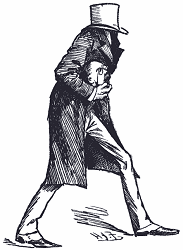Pax Nortona – A Blog by Joel Sax
From the Land of the Lost Blunderbuss
Home - Spirituality and Being - Myths & Mysticism - Big Jim and Little Jim
Big Jim and Little Jim
Posted on September 29, 2004 in Myths & Mysticism
 One of the tragedies of the Bible as translated into English (and perhaps other languages) is that the translations take themselves more seriously than the original texts. There is nothing funnier, for example, than the tale of Balaam and his ass. Laugh out loud at this or any other passage can be hazardous to the health of your inner ear should a preacher, an Irish monsignor, or a strained-face believer be handy. Out of this fascinating anthology of Hebrew, Aramaic, and Greek literature, the self-appointed priests of the leatherette temple have drained the life.
One of the tragedies of the Bible as translated into English (and perhaps other languages) is that the translations take themselves more seriously than the original texts. There is nothing funnier, for example, than the tale of Balaam and his ass. Laugh out loud at this or any other passage can be hazardous to the health of your inner ear should a preacher, an Irish monsignor, or a strained-face believer be handy. Out of this fascinating anthology of Hebrew, Aramaic, and Greek literature, the self-appointed priests of the leatherette temple have drained the life.
As translated, the names of the Apostles are off-putting. Foremost in my mind are those of the two Jameses: James the Greater and James the Lesser is how sour ecclesiasts call them.
 What makes James the Greater greater than James the Lesser? It was James the Lesser who was regarded as the chief of the Church after Peter until the fall of Jerusalem in 70 BC. It is he whose name appears on the Letter of James which blithely tells us that faith without works doesn’t hack it as faith. So many a reader mixes up the two Jameses. And, worse, they miss out on the warmth of the collective of friends who comprise the Twelve Apostles.
What makes James the Greater greater than James the Lesser? It was James the Lesser who was regarded as the chief of the Church after Peter until the fall of Jerusalem in 70 BC. It is he whose name appears on the Letter of James which blithely tells us that faith without works doesn’t hack it as faith. So many a reader mixes up the two Jameses. And, worse, they miss out on the warmth of the collective of friends who comprise the Twelve Apostles.
When we return to the Aramaic and translate it according to its original feel, I understand, the Spirit revives. We flutter with the Dove and the tickle of its feathers makes us laugh with delight. It’s not “James the Greater” or “James the Lesser”. It’s James the Taller and James the Shorter. Or, to put it more colloquially, Big Jim and Little Jim.
Now I could hang with those guys. These apostles enjoyed life. They joked with the women. They balanced pickles on their noses. The only sourpuss among them appears to have been Judas, the money-keeper, who worried about the practical side of the Jesus industry. Judas who foreran our modern day Ministers in Business Suits. I don’t doubt that the rest of the apostles tolerated him as little more than a necessary evil. The message of Jesus got through to the rest of them: relax, enjoy your time here on earth, worship God, and love your neighbor, too.
It’s easier to love God when He makes you feel happy.
Another tidbit about translation. In the memorable opening words of John, there is the line usually translated “a Light which the darkness could not overpower”. The word “overpower” has a double meaning in Greek. It can also mean “comprehend”. “A Light which the darkness could not comprehend/understand”.
When I read of the frustrations of my friend Bill Hopkins in a comment here, regarding the insistance of a reading group that Thich Nhat Hanh’s methods strike them as “impractical”, I think of this other meaning. When they apply their value system of “practicality” — methods that yield power and wealth — it is clear to me that they still reside in the darkness. To put it simply, they don’t get Jesus and Buddha. Which goes a long way to explain Fundamentalism, conservative Catholicism, and many other aberrations of American Christianity.
How do I assess myself? I’m either loitering in the twilight or the dawn. It’s half-light.

